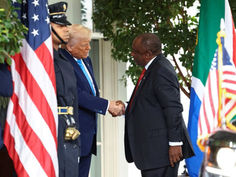The EU Threatens Retaliatory Tariffs on US Goods Amid Escalating Trade Tensions
- Rahaman Hadisur

- Apr 17, 2025
- 3 min read
Hadisur Rahman, Jadetimes Staff
H. Rahman is a Jadetimes news reporter covering Business

The European Union (EU) has officially warned of retaliatory tariffs on a broad range of American products, intensifying global trade tensions. If trade talks with the United States fail to yield a satisfactory resolution, the EU plans to impose additional customs duties of 25% on key US exports such as soybeans, eye makeup, toilet paper, motorcycles, and more.
So, what are we going to get from this article? Now we will break down what led to this situation, what’s at stake for both sides, and what it could mean for global markets.
The Background: Trump-Era Tariffs and Ongoing Negotiations
The move is part of a broader trade war initiated by former US President Donald Trump, who imposed steep tariffs on multiple trading partners, including the EU. These include a 25% levy on steel and aluminum imports, as well as tariffs on cars, car parts, and other EU goods.
In response, the European Commission initially prepared its own set of tariffs but paused implementation for 90 days to allow room for negotiation. However, with talks showing limited progress, the bloc is readying itself for action.
“The European Union has paused its countermeasures on unjustified US trade tariffs to allow time and space for EU-US negotiations,” the Commission said in a statement.
What Products Are Targeted?
The European Commission’s list includes nearly 1,700 US products, with around 400 items set to face immediate tariffs if negotiations break down. These include:
Toilet paper
Soybeans – the largest US agricultural export to Europe
Eye makeup and cosmetics
Motorcycles
Tree nuts (e.g., almonds)
Fresh fruits
While many of the US's top exports to the EU like pharmaceuticals, medical equipment, oil and gas, and aerospace parts have been spared for now, the EU’s approach is strategic. It aims to target sectors that create political pressure at home in the US, especially those involving agriculture and consumer goods.
The Economic Implications: Could This Spark a Recession?
Billionaire investor Ray Dalio, Founder of Bridgewater Associates, has voiced serious concern. He warned that Trump’s tariff war could trigger “something worse” than a recession if tensions continue to escalate unchecked.
And he may be right.
Trade wars lead to higher consumer prices, disrupted supply chains, and strained international relations. The ripple effect could impact not just American and European economies, but the entire global financial system.
A Word from Europe: Frustration Mounts
French minister François Bayrou didn’t mince words when addressing the crisis:
“The president of the United States has unleashed a hurricane whose consequences will not disappear anytime soon by firing the starting gun on a global trade war without warning overnight, imposing unimaginable customs duties.”
This is what we get to know from the European stance: retaliation is not just a choice, but a perceived necessity.
What’s Next?
If negotiations do not yield positive results by mid-July, the EU's 25% tariffs on hundreds of US goods are expected to go into effect. Another batch of products over 1,300 items may be hit at a later stage.
Both sides remain locked in a tense standoff, and unless common ground is found soon, consumers and businesses may be caught in the economic crossfire.
Why This Matters to Everyone
This is not just a war of policies it’s a battle that affects prices at the grocery store, international markets, and diplomatic relations worldwide. While the EU is holding back to give diplomacy a chance, the message is clear: if the US continues with protectionist measures, it should be ready to face the consequences.
This is how we get to understand the delicate balance of global trade, where one decision can tip the scale for millions of people.











































Comments